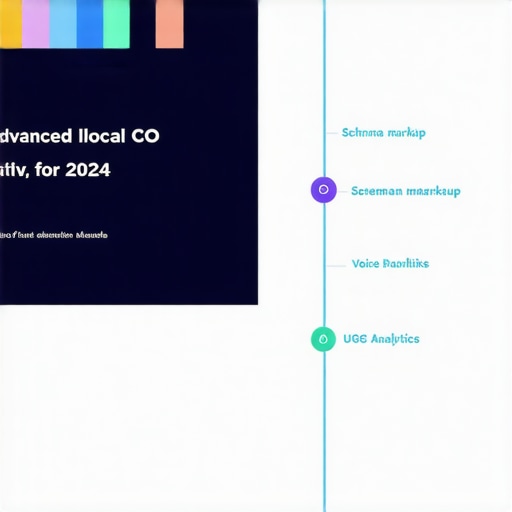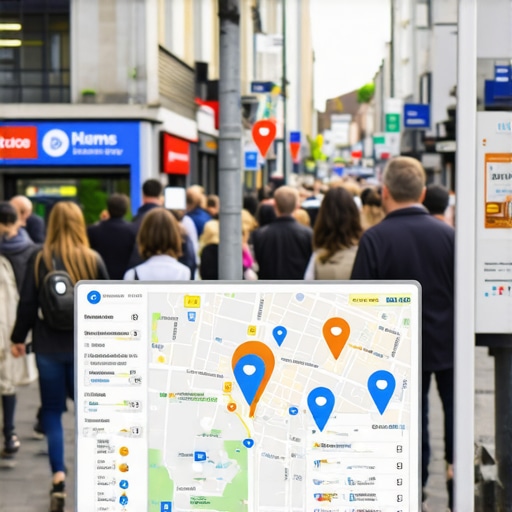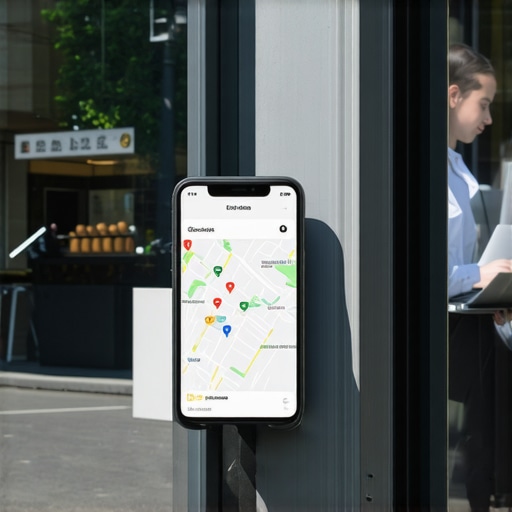Unleashing the Power of Local Search: Are You Playing to Win?
Imagine this: you’re a local business owner, and every day, potential customers are searching for your services right around the corner. Yet, somehow, your Google My Business (GMB) listing sits in the shadows, unnoticed. Frustrating, isn’t it? But here’s the kicker—by harnessing the right local search strategies, you can turn that invisible presence into a bustling storefront. Ready to dive into the treasure trove of tips that will elevate your local SEO game in 2024? Buckle up!
Why Local Optimization Is Your Secret Weapon
Let’s face it—local SEO is no longer optional; it’s essential. According to Moz, local searches lead to increased foot traffic and higher conversions. But what exactly makes a GMB listing stand out amidst the digital crowd? It’s about crafting a compelling, authentic profile that resonates with both search engines and humans alike. Think of your GMB as your digital storefront—first impressions matter.
Are You Optimizing Your Google My Business Profile Like a Pro?
Have you filled out every nook and cranny of your GMB profile? From accurate NAP (Name, Address, Phone Number) info to vibrant photos and engaging posts, every detail counts. Don’t forget to select the right categories—this is where many stumble, missing out on critical visibility. For expert insights, check out this comprehensive guide on GMB optimization techniques.
What About Local Keywords—Are You Using Them Wisely?
Keywords are the backbone of SEO, but local keywords are the secret sauce. Think beyond generic terms—incorporate neighborhood names, landmarks, and colloquial phrases your customers might use. Embedding these naturally into your website content, GMB posts, and FAQs can dramatically improve your local ranking. Remember, it’s about relevance and context, not keyword stuffing.
Is Your Online Reputation Working for You?
Reviews are the currency of trust in local search. Encourage satisfied customers to leave reviews and respond professionally to all feedback. Not only does this boost your credibility, but it also signals to Google that your business is active and valued by customers. It’s a small effort with a big payoff, as highlighted in this article on reputation management.
Now, the Big Question—Are You Ready to Dominate Local Search in 2024?
These strategies are just the tip of the iceberg. Implementing them requires consistency, creativity, and a dash of SEO savvy. Are you prepared to overhaul your local SEO approach? Or are you content to watch competitors leap ahead while your business stays in the shadows? Share your thoughts below, and let’s ignite a conversation about transforming local search results into your new best friend.
Are You Leveraging Local Search to Its Full Potential?
As a seasoned SEO professional, I often ponder: Are local businesses truly capitalizing on the latest advancements in local search? The reality is, many still rely on outdated tactics, missing out on the nuanced opportunities that modern SEO provides. For instance, smartly integrating voice search optimization and leveraging Google’s local pack can significantly boost visibility. With evolving algorithms, staying ahead requires more than just basic GMB setup; it demands a strategic, data-driven approach. For comprehensive insights, explore effective local search strategies.
What Are the Hidden Factors That Can Elevate Your Local SEO?
Beyond the obvious, factors such as schema markup, local backlinks, and optimized mobile experience play pivotal roles. Did you know that implementing local schema can enhance your listings’ appearance in search results, making them more attractive and clickable? Additionally, cultivating local backlinks from community partners and directories can serve as powerful endorsements that Google values. An optimized mobile site ensures users on smartphones have a seamless experience, reducing bounce rates and increasing conversions. These elements, when combined, create a robust local SEO ecosystem that outperforms competitors who neglect them.
Could Your Business Be Missing Out on Hyper-Local Opportunities?
Considering the surge in ‘near me’ searches, is your business positioned to attract hyper-local traffic? These micro-moments are critical for brick-and-mortar stores aiming to outshine competitors. Incorporating neighborhood-specific keywords, participating in local events, and actively engaging with community social media groups can transform your local presence. Research from BrightLocal shows that 84% of consumers trust online reviews as much as personal recommendations, emphasizing the importance of reputation management in hyper-local marketing. For strategies to maximize your Google My Business impact, visit GMB optimization techniques.
Thinking creatively about local SEO can unlock new streams of traffic and customer engagement. Share your successes or challenges below—your insights could inspire others to elevate their local search game!
Unlocking the Power of Structured Data: Schema Markup as a Game-Changer in Local SEO
While many local businesses focus on basic optimization, integrating schema markup — a form of structured data — can dramatically enhance your local search visibility. Schema helps search engines understand the context of your content, enabling rich snippets that attract more clicks. For instance, adding local business schema can display your operating hours, reviews, and location directly in search results, making your listing stand out amidst competitors.
According to a study by Search Engine Journal, implementing schema markup can increase click-through rates by up to 30%. Yet, many businesses overlook this vital component due to perceived complexity. Fortunately, tools like Google’s Structured Data Markup Helper simplify this process, allowing you to code your site efficiently. For a practical example, consider integrating schema for events, special offers, or product availability, which can be hyper-targeted for local audiences.
Harnessing the Power of Local Backlinks: Building Authority in Your Community
Backlinks remain a cornerstone of SEO, but in local search, quality local backlinks are particularly potent. Establishing connections with local newspapers, chambers of commerce, and community blogs can serve as powerful endorsements that boost your Google rankings. These links not only improve your authority but also drive referral traffic from trusted local sources.
One innovative approach involves sponsoring local events or charity drives, then leveraging the event’s web presence for backlinks—these are often highly relevant and authoritative. Moreover, engaging with local influencers on social media can lead to mentions and links that further amplify your reach. As Moz highlights, a diverse backlink profile rooted in local communities signals to Google that your business is an integral part of the local ecosystem.
Is Your Mobile Experience Truly Optimized for Hyper-Local Engagement?
Given that over 70% of local searches happen on mobile devices, a seamless mobile experience is non-negotiable. But beyond responsiveness, consider implementing accelerated mobile pages (AMP) for quick-loading content tailored to local queries. Additionally, optimizing your site’s user interface to highlight local features—such as maps, directions, and local reviews—can significantly reduce bounce rates and increase conversions.
Furthermore, leveraging geolocation data with mobile apps or push notifications can facilitate hyper-local marketing, offering tailored deals or information based on a user’s exact location. Google’s focus on mobile-first indexing underscores the importance of prioritizing a top-tier mobile experience in your local SEO strategy.
How Can Voice Search and AI Technologies Revolutionize Local SEO in 2024?
As voice assistants and AI-driven search become more prevalent, understanding their impact on local SEO is crucial. Voice searches tend to be more conversational and question-based, often involving hyper-local queries like “What’s the best pizza place near me?” To optimize for voice, incorporate natural language keywords, FAQs, and long-tail phrases into your content.
Research from Think with Google indicates that 41% of consumers use voice search to find local businesses weekly. Incorporating AI tools like chatbots can also enhance user engagement by providing instant, localized responses, fostering trust and encouraging conversions. Staying ahead in this space requires a nuanced understanding of how voice and AI are shaping consumer behavior and adjusting your content strategies accordingly.
If you’re eager to deepen your local SEO mastery, I invite you to explore advanced courses and resources that cover schema implementation, backlink building, mobile optimization, and emerging voice search techniques. The future belongs to those who adapt swiftly and strategically—don’t get left behind!
How Can Advanced Schema Markup Techniques Further Elevate Your Local Visibility?
While basic schema markup significantly enhances local search results, sophisticated implementations can provide even greater leverage. Implementing nested schemas, such as combining LocalBusiness with Service and Review schemas, creates a rich semantic context that search engines interpret more accurately. According to Search Engine Land, advanced schema strategies can increase your chances of qualifying for rich snippets, knowledge panels, and featured snippets, directly impacting click-through rates and local engagement. For example, embedding event schemas for local promotions or seasonal offers can attract hyper-targeted traffic, especially when integrated with dynamic data feeds.
What Are the Cutting-Edge Local Backlink Tactics for 2024?
In an era where domain authority continues to influence local rankings, innovative backlink strategies are vital. Beyond traditional partnerships, consider leveraging local podcasts or online radio stations to secure mentions and backlinks. Participating in collaborative content projects with local influencers or creating resource hubs for community-specific topics can generate organic backlinks from authoritative sources. Moz emphasizes that backlinks from .gov and .edu domains, when relevant, can considerably boost your local authority. Additionally, sponsoring local virtual events or webinars can result in backlinks from event-related websites and press releases, amplifying your local SEO efforts.
How Can Voice Search Optimization Be Tailored for Hyper-Local Engagement?
Voice search is transforming local search behavior, with queries becoming increasingly conversational and context-aware. To capitalize on this trend, craft content that anticipates natural language questions like “Where can I find the best coffee near me?” or “What are the opening hours of XYZ in downtown?”. Incorporating long-tail, question-based keywords into FAQs and service descriptions is crucial. Moreover, optimizing your Google My Business profile with detailed, keyword-rich descriptions and accurate NAP data ensures your business appears prominently in voice search results. According to a report by BrightLocal, 58% of voice search users rely on it to find local businesses weekly, highlighting the importance of voice-first optimization. For a comprehensive approach, explore advanced GMB optimization tips.
What Role Does User-Generated Content Play in Building a Local SEO Powerhouse?
Encouraging and showcasing user-generated content (UGC) such as reviews, photos, and testimonials can significantly boost your local SEO authority. UGC not only enriches your profile with fresh, relevant content but also signals active, engaged customer relationships to search engines. Implement strategies like incentivizing reviews through loyalty programs or social media campaigns. Additionally, integrating UGC into your website and GMB posts creates dynamic content that can improve keyword relevance and user trust. A recent study by BrightLocal found that 91% of consumers read online reviews before visiting a local business, underscoring the importance of cultivating authentic UGC.
How Can Local SEO Analytics and Data-Driven Insights Inform Your Strategy?
Advanced local SEO success hinges on meticulous analysis of performance metrics. Tools like Google Analytics, Search Console, and specialized local SEO platforms provide valuable insights into user behavior, search patterns, and conversion paths. By dissecting data on local search queries, click-through rates, and user engagement, businesses can fine-tune their content and optimization tactics. For instance, identifying high-performing keywords allows for targeted content creation, while understanding user drop-off points highlights areas for UX enhancement. As outlined by SEMrush, a data-driven approach ensures your local SEO efforts adapt swiftly to evolving search algorithms and consumer preferences, maximizing ROI.
<
Expert Insights & Advanced Considerations
1. Harness the Power of Schema Markup for Rich Snippets
Implementing sophisticated schema markup, such as nested LocalBusiness schemas combined with Service and Review schemas, enhances search result appearance, increasing click-through rates and local visibility. This semantic depth allows search engines to better understand your offerings, positioning your business prominently in local packs and knowledge panels.
2. Cultivate High-Quality Local Backlinks Strategically
Building backlinks from authoritative local sources like chambers of commerce, community blogs, or local event sponsorships signals credibility to Google. Diversify your backlink profile with mentions from local podcasts, media outlets, and educational institutions to establish authority and improve rankings in hyper-local searches.
3. Optimize for Voice Search with Natural Language and Local Intent
With the rise of voice assistants, tailoring content for conversational queries such as “Where’s the best sushi near me?” or “Open hours for XYZ in downtown” is critical. Incorporate FAQ sections with long-tail, question-based keywords and ensure your GMB profile is detailed and keyword-rich to capture voice-driven local traffic effectively.
4. Leverage User-Generated Content to Build Trust and Freshness
Encourage reviews, photos, and testimonials from customers to enrich your profile and website content. Authentic UGC boosts local relevance, enhances engagement signals, and influences search rankings, especially when integrated into your GMB posts and website pages.
5. Embrace Mobile-First and Accelerated Mobile Pages (AMP) Optimization
Ensure your website is fully responsive and loads swiftly on mobile devices. Implement AMP for local landing pages to reduce bounce rates and improve user experience, which are key ranking factors in local search results.
Curated Expert Resources
- Google’s Structured Data Markup Helper: Simplifies schema implementation, enabling rich snippets that attract more local traffic.
- BrightLocal Local Search Study: Provides data-driven insights into consumer behavior and review importance for local SEO.
- Moz Local SEO Resources: Offers advanced techniques for local backlink building and reputation management.
- Think with Google – Voice Search Trends: Insights into evolving voice search behaviors and optimization strategies.
- Search Engine Journal Schema Markup Guide: Detailed tutorials for implementing nested schemas and advanced structured data.
Final Expert Perspective
Mastering local SEO in 2024 requires a nuanced approach that combines technical prowess, strategic outreach, and consumer-centric content optimization. Leveraging advanced schema markup, cultivating authoritative local backlinks, and adapting to voice search trends are no longer optional—they are essential. As an expert, I encourage you to continuously refine your tactics, stay informed with authoritative resources, and actively engage with your local community through authentic content and partnerships. Your business’s visibility and reputation depend on it. Dive deeper into these strategies and share your insights—your experience can inspire others to elevate their local search game to new heights.



This post really hits home on how crucial it is to leverage every aspect of local SEO to stand out in a crowded market. I’ve seen firsthand how implementing schema markup and actively cultivating local backlinks made a noticeable difference in our rankings and click-through rates. One thing I’ve found particularly effective is sponsoring small community events and then working to get backlinks from those event pages — it’s a win-win for brand visibility and authority. I wonder, with the rapid rise of AI and voice tech, how do you see small businesses like mine staying ahead without getting overwhelmed? Do you have quick tips for integrating these advanced strategies without requiring a full-time SEO team? Would love to hear what others are experimenting with in this space.
This article sheds light on how critical a well-rounded approach to local SEO is, especially as search algorithms become more sophisticated. I particularly agree with the emphasis on structured data and local backlinks—those are often overlooked but can make a huge difference in visibility and credibility. When I started incorporating local schema markup on my website, I noticed an immediate uptick in click-through rates because my listings looked more informative in the results. The challenge I often face is balancing all these elements without feeling overwhelmed, especially for small teams. One thing that worked for me was adopting a modular approach—focusing on one or two strategies at a time, like optimizing for voice search and building quality local backlinks, then expanding from there. How have others managed to integrate these advanced tactics smoothly without spreading themselves too thin? Any tools or processes that have made your efforts more manageable? Would love to hear experiences from those who’ve navigated these waters successfully.
This post really underscores how important a comprehensive approach to local SEO is, especially with the rapid advancements in voice search and structured data. I’ve personally seen how implementing local schema markup significantly improved our visibility in search results, making our listings more attractive with rich snippets. It’s fascinating how these technical elements can have such a tangible impact on click-through rates. I also agree that local backlinks from community sources and partnerships can boost authority and credibility immensely. One challenge I’ve encountered is balancing these technical optimizations with content creation and community engagement without feeling overwhelmed. For small businesses, what balancing strategies or tools have others found effective to manage these diverse tactics? I’d love to hear real-world examples and insights from those who’ve successfully layered these strategies in a manageable way.
This post really hits the nail on the head about how critical it is for local businesses to stay proactive with their SEO strategies, especially as the landscape evolves so rapidly. I’ve personally found that integrating structured data like schema markup and actively sourcing local backlinks from community events can really boost a business’s visibility. One thing that often gets overlooked is ensuring your mobile experience is top-notch; with most local searches happening on mobile, a seamless experience can make or break conversions. It made me think, how are small businesses managing to keep up with voice search optimization and mobile updates without a dedicated tech team? Are there tools or agencies you recommend for manageable, step-by-step improvements that don’t overwhelm? Would love to hear some practical tips from others who are making gradual but steady progress in local SEO in 2024.
This post offers a comprehensive view of what it takes to dominate local search in 2024. Having worked with small local businesses, I can attest that the technical aspects like schema markup and backlinks are game-changers, but the real challenge is staying consistent with all these tactics. I’ve found that setting up a detailed content calendar for GMB posts, reviews, and local backlinks can help keep efforts manageable. One thing I often recommend to clients is leveraging local partnerships—like sponsoring events or collaborating with community influencers—as these not only boost backlinks but also foster genuine community engagement. With the rise of voice search, I’m curious—what are some low-effort ways small businesses can optimize FAQs for voice queries without overhauling their entire website? It seems like a practical starting point that can yield immediate results.